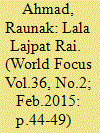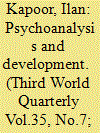|
|
|
Sort Order |
|
|
|
Items / Page
|
|
|
|
|
|
|
| Srl | Item |
| 1 |
ID:
134641


|
|
|
|
|
| Summary/Abstract |
Despite sustained critique of a neo-Malthusian focus on ‘overpopulation’, the issue continues to resurface regularly within international development discourse, particularly with respect to ‘sustainable’ development in relation to growing environmental security concerns. This suggests that the issue defies purely rational evaluation, operating on a deeper psychodynamic register. In this paper we therefore analyse the population question as a ‘scapegoat’, in the psychoanalytic sense of a fantasmatic construction concealing the gap between the symbolic order of international development and its persistent failure in practice. By conjuring the age-old image of animalistic barbarian hordes breeding inexorably and therefore overflowing their Third World confines to threaten the security – and enjoyment – of wealthier nations, the overpopulation bogeyman helps to displace attention from systemic issues within the political economy of development, namely, the futility of pursuing sustainable development within the context of a neoliberal capitalism that characteristically exacerbates both economic inequality and environmental degradation.
|
|
|
|
|
|
|
|
|
|
|
|
|
|
|
|
| 2 |
ID:
142640


|
|
|
|
|
| Summary/Abstract |
The Sustainable Livelihoods Approach (SLA) is promoted as a useful way to centre development on the needs of those who are most vulnerable, but is critiqued for inflexibility and ignoring important power relations. In light of the rigidities in using a formulaic SLA, this conceptual paper suggests a practical suite of tools that are in use in livelihoods research and development practice, and refocuses them to include adaptive strategies of vulnerable peoples to resource management pressures. The Pentagon Prison of five capitals can overwhelm both the researcher and researched and while possibly useful in identifying livelihoods gaps, misses all-encompassing power relations, and reduces complexities to quantitative units. In arguing for a shift from the Pentagon Prison of SLA towards a flexible livelihoods trajectory approach, in particular for a research project on livelihood adaptations in Lao PDR, I identify a feasible research and development approach that more meaningfully reflects the lives of those participating in that research. I propose that the livelihood trajectories approach opens up the way data are gathered and can lead to holistic understandings of the complex realities of peoples' adaptive strategies, incorporating strategies from short to long term, and proactive, reactive and inactive techniques.
|
|
|
|
|
|
|
|
|
|
|
|
|
|
|
|
| 3 |
ID:
135859


|
|
|
|
|
| Summary/Abstract |
In Afghanistan ethnic Hazaras are a group with a long history of marginalization, and even outright persecution, mainly because of their Shi'a Muslim faith. Only after the international intervention in 2001 have socio-economic opportunities started to open up for Hazaras. Hazaras, however, maintain a strong perception of still being considered second-class citizens, claiming to be overlooked by the Afghan government and allotted fewer funds by the international development community. This paper examines Hazara perceptions of marginality with reference to one issue: the lack of state-provided electricity in Bamyan province, which many consider the Hazara homeland. Anti-government protests in Bamyan often revolve around this particular issue, and the demand for electricity has become part of the permanent landscape, through a lantern sculpture in Bamyan's main square, as well as through the experience of living one's everyday life with a lack of easily available electric light. The lack of electricity becomes an embodied, daily reminder of perceived subordination to other religio-ethnic groups and the feeling of being left behind by the international community.
|
|
|
|
|
|
|
|
|
|
|
|
|
|
|
|
| 4 |
ID:
136676


|
|
|
|
|
| Summary/Abstract |
While surveying India's present economic condition and policies and evaluating the role of successive developmental schemes and social programmes, this paper highlights the persistent problems faced by the country such as administrative inefficiency, endemic poverty, lack of infrastructure and widespread corruption. Some ambitious strategies adopted by the Modi government to tackle the problem of inclusive growth are outlined as well.
|
|
|
|
|
|
|
|
|
|
|
|
|
|
|
|
| 5 |
ID:
136680


|
|
|
|
|
| Summary/Abstract |
While surveying India's present economic condition and policies and evaluating the role of successive developmental schemes and social programmes, this paper highlights the persistent problems faced by the country such as administrative inefficiency, endemic poverty, lack of infrastructure and widespread corruption. Some ambitious strategies adopted by the Modi government to tackle the problem of inclusive growth are outlined as well.
|
|
|
|
|
|
|
|
|
|
|
|
|
|
|
|
| 6 |
ID:
136840


|
|
|
|
|
| Summary/Abstract |
Lala Lajpat Rai’s modern perspective in the social and economic field such as religion, education, community, development etc. together with his strong understanding of his own rich culture, places him as one of the most important reformer of India. His thoughts were the perfect blend of best understanding of the West and East.
|
|
|
|
|
|
|
|
|
|
|
|
|
|
|
|
| 7 |
ID:
136144


|
|
|
|
|
| Summary/Abstract |
Policies designed for sustainable development are becoming ever more complex and ambiguous. Assessments should thus incorporate development representations and values, rather than only relying on economic and financial normative indicators. This paper proposes a conceptual framework that acknowledges the plurality of the various stakeholders' viewpoints. We suggest that evaluation of grassroots development policies could provide an innovative and more integrative way to measure development by broadening the scope to encompass both livelihood and welfare dimensions. Based on the assessment of a development scheme in New Caledonia, we argue that this cognitive and shared approach could be used to obtain a contextualised measurement of development. Two conditions further strengthen this approach: combining the use of different types of measurement tools, and adopting a rigorous quantitative measurement approach, in line with the collective representations. This promising approach may be applied to gain insight into the ability of implemented policies to address local development choices.
|
|
|
|
|
|
|
|
|
|
|
|
|
|
|
|
| 8 |
ID:
136965


|
|
|
|
|
| Summary/Abstract |
This paper examines the impact of military expenditure on economic growth on a large balanced panel, using an exogenous growth model and dynamic panel data methods for 106 countries over the period 1988–2010. A major focus of the paper is to consider the possibility group heterogeneity and non-linearity. Having estimated the model for all of the countries in the panel and finding that military burden has a negative effect on growth in the short and long run, the panel is broken down into various groupings based upon a range of potentially relevant factors, and the robustness of the results is evaluated. The factors considered are different levels of income, conflict experience, natural resources abundance, openness and aid. The estimates for the different groups are remarkably consistent with those for the whole panel, providing strong support for the argument that military spending has adverse effects on growth. There are, however, some intriguing results that suggest that for certain types of countries military spending has no significant effect on growth.
|
|
|
|
|
|
|
|
|
|
|
|
|
|
|
|
| 9 |
ID:
136964


|
|
|
|
|
| Summary/Abstract |
This paper examines the impact of military expenditure on economic growth on a large balanced panel, using an exogenous growth model and dynamic panel data methods for 106 countries over the period 1988–2010. A major focus of the paper is to consider the possibility group heterogeneity and non-linearity. Having estimated the model for all of the countries in the panel and finding that military burden has a negative effect on growth in the short and long run, the panel is broken down into various groupings based upon a range of potentially relevant factors, and the robustness of the results is evaluated. The factors considered are different levels of income, conflict experience, natural resources abundance, openness and aid. The estimates for the different groups are remarkably consistent with those for the whole panel, providing strong support for the argument that military spending has adverse effects on growth. There are, however, some intriguing results that suggest that for certain types of countries military spending has no significant effect on growth.
|
|
|
|
|
|
|
|
|
|
|
|
|
|
|
|
| 10 |
ID:
134637


|
|
|
|
|
| Summary/Abstract |
This article examines the contributions of psychoanalysis to international development, illustrating ways in which thinking and practice in this field are psychoanalytically structured. Drawing on the work of Lacan and Žižek, the article will emphasise three key points: (1) psychoanalysis can help uncover the unconscious of development – its gaps, dislocations, blind spots – thereby elucidating the latter’s contradictory and seemingly ‘irrational’ practices; (2) the important psychoanalytic notion of jouissance (enjoyment) can help explain why development discourse endures, that is, why it has such sustained appeal, and why we continue to invest in it despite its many problems; and (3) psychoanalysis can serve as an important tool for ideology critique, helping to expose the socioeconomic contradictions and antagonisms that development persistently disavows (eg inequality, domination, sweatshop labour). But while partial to Lacan and Žižek, the article will also reflect on the limits of psychoanalysis – the extent to which it is gendered and, given its Western origins, universalisable.
|
|
|
|
|
|
|
|
|
|
|
|
|
|
|
|
| 11 |
ID:
135163


|
|
|
|
|
| Summary/Abstract |
While many are familiar with the enticing of American transcontinental railroad construction through land grants from national, state, and local governments, there was a range of other stimulative efforts to facilitate railroad development. These included tax breaks, investment credits, and otherwise favorable decisions supporting these business interests. They also involved, in some instances, direct subsidies; monopolies not only on railroad operations but also in ancillary and even tertiary industries; and changes to regulations to ease requirements for labor, safety, and other factors. This article examines the analogue between railroad development in the U.S. and that of space exploitation specific to access to space, involving space launch technology development, drawing several key findings from the railroad experience. It suggests that there is a broad range of options that have been pursued in the past to stimulate investment in infrastructure—in this case in railroads—that have application for future space access operations. Not all of these options were successful—some failed outright and others had detrimental unintended consequences—and that is discussed as well.
|
|
|
|
|
|
|
|
|
|
|
|
|
|
|
|
| 12 |
ID:
137200


|
|
|
|
|
| Summary/Abstract |
Using crime review figures for four randomly selected states in Nigeria, this study examines cases of kidnapping and its implications for the national economy. The findings reveal that kidnapping is consistently on the increase in Nigeria and is not evenly spread across regions. It is shown that 15 cases were recorded in 2005 and 43 cases in 2008. In 2009, 138 cases were officially recorded, of which 22% and 76% occurred in Rivers and Edo states respectively. Findings further showed that modern kidnapping in Nigeria is triggered by resource control disputes directed both at oil expatriate workers and at prominent citizens, politicians and members of their families. The crisis, which came to the fore in 2005, has forced oil production shutdowns of up to 800 000 barrels per day. The study concludes that kidnapping is becoming a serious crime in Nigeria with significant negative implications for foreign investment, national foreign exchange earnings, and revenue generation.
|
|
|
|
|
|
|
|
|
|
|
|
|
|
|
|
| 13 |
ID:
136422


|
|
|
|
|
| Summary/Abstract |
This article analyzes the growing role of migrants’ remittances in the new reality created by the significant changes in the functioning of the global and national economy. It attempts to show that economic development based on the use of primarily recurring external financial sources pegged to indicators of threshold values of the external debt under formation and indicators for retaining macroeconomic stability is creating significant risks.
The author examines the dynamics of the volume of migrants’ remittances in this respect, as well as their importance for Tajikistan’s economic and social development, particularly in ensuring the country’s macroeconomic stability. This is shown in the drawing up of a new National Mid-Term Development Strategy.
The article also states the need for taking efficient steps to transform remittances into investment and financial assets; in the near future, they should be used to create the country’s production potential. This will create conditions not only for making the Tajik economy less dependent on external factors, but also allow it to gain additional advantages from its accession to the WTO.
|
|
|
|
|
|
|
|
|
|
|
|
|
|
|
|
| 14 |
ID:
136690


|
|
|
|
|
| Summary/Abstract |
Tomb robbing is sometimes described as the second-oldest profession. It ebbs and flows as local and international conditions change, and it flourishes in poor countries. Carefully managed aid, development, education and policing can reduce it but, according to the experts, it has been growing steadily for the past hundred years
|
|
|
|
|
|
|
|
|
|
|
|
|
|
|
|
|
|
|
|
|